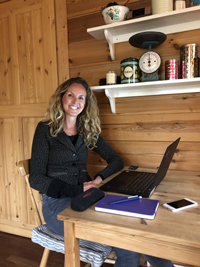Deans diary #29 - with future head of department of Psychology
Todays guest writer is Vibeke Koushede, new head of the Department of Psychology as of 1 May. Until today she is professor in public health with special responsibilities at National Institute of Publich Healt at the University of Southern Denmark.

How come some people handle stressors better than others? And what role do our social relations play?
Those questions often kept me awake at night back in the mid-1990s, and became the starting point for my interest into psychology and social sciences, broadly understood.
In 1995, I traveled to England to study midwifery, where I relatively soon after my arrival fell pregnant (something I would otherwise have sworn could never happen to "someone like me" at such a young age!). I could not support a child and myself on my bursary. Next to my midwifery studies, I therefore began to work as an assistant in a psychiatric ward and at the local pub in the socially deprived area in which I lived. The encounter with the diversity of people in very different contexts, each with their own personal history, sparked my curiosity – How come some people handle stressors better than others? How do different people think and act in relation to the challenges and bumps they encounter along the way, and why? And what role do our social relations play?
In my quest to answer this, I gained a gradual understanding of the role of one's childhood experiences, living conditions, personal skills, cognitive abilities, social relationships, and not least, the neighboring community and social and cultural context. At the time, I would hardly have used these exact terms to define my initial insights, nor did I know the methods by which I could systematically examine the topics and prove or disprove the hypotheses I had. This did not become clear until later once I started doing research in mental health and wellbeing. As part of my research, I have been particularly interested in protective factors for mental health and wellbeing, and in the crucial role, our social relations play.
In the year 2000, I moved back to Denmark, where I worked as a midwife for six years before taking a Master's in Public Health and subsequently a PhD at the University of Copenhagen. For the past 10 years, I have worked at the National Institute of Public Health, University of Southern Denmark, where I have done research in mental health and mental health promotion. I have been particularly concerned with bridging the gap between research, policy and practice, and have generally worked in multidisciplinary and cross-organizational partnerships.
The most important resource we have is one another. This is a phrase I have used a multitude of times in connection with lectures and workshops on mental health, but rarely has it felt more accurate than it does right now.
The sustainability, prosperity and ability of a society to solve complex issues is completely dependent on social and mental capital.
Denmark is a small country in a constantly changing world. In a society characterized by increasing globalization, increased competition, technological and demographic development, as well as global challenges such as climate change, pandemics etc., our material resources are of course crucial, but so is our social and mental capital.
We humans are able to solve even the most complex issues, if we put silo thinking, individual vanity, zero-fault-tolerance, mistrust and knowledge hoarding aside. When we instead focus on working together to solve a common problem, where we draw on each other's resources, competencies and expertise in different disciplines – in short, when we play each other stronger – we are more likely to succeed. An African proverb goes: “If you want to travel fast, travel alone, if you want to travel far, travel together”.
The knowledge and competencies we have at the Department of Psychology and across SAMF are crucial to solving some of the complex societal issues we face. I will work to ensure that the Department plays a prominent role. We know that good results can only be achieved, when our staff and students thrive individually as well as together. I will therefore focus on how we can create and secure a healthy and attractive study and work environment whilst supporting and empowering one another both at the Department of Psychology, as well as across SAMF.
No one knows everything, everyone knows something, and together we can do more.
I look very much forward to meeting you all and to our future collaboration.
Kind regards,
Vibeke
Related News
Contact

Dean Mikkel Vedby Rasmussen
Faculty of Social Sciences
Mobile: +45 21 18 10 48
Mail: dekan@samf.ku.dk
Guest writer

Vibeke Koushede
Head of department
(as of 1 May 2020)
Department of Psychology
vjk@psy.ku.dk
